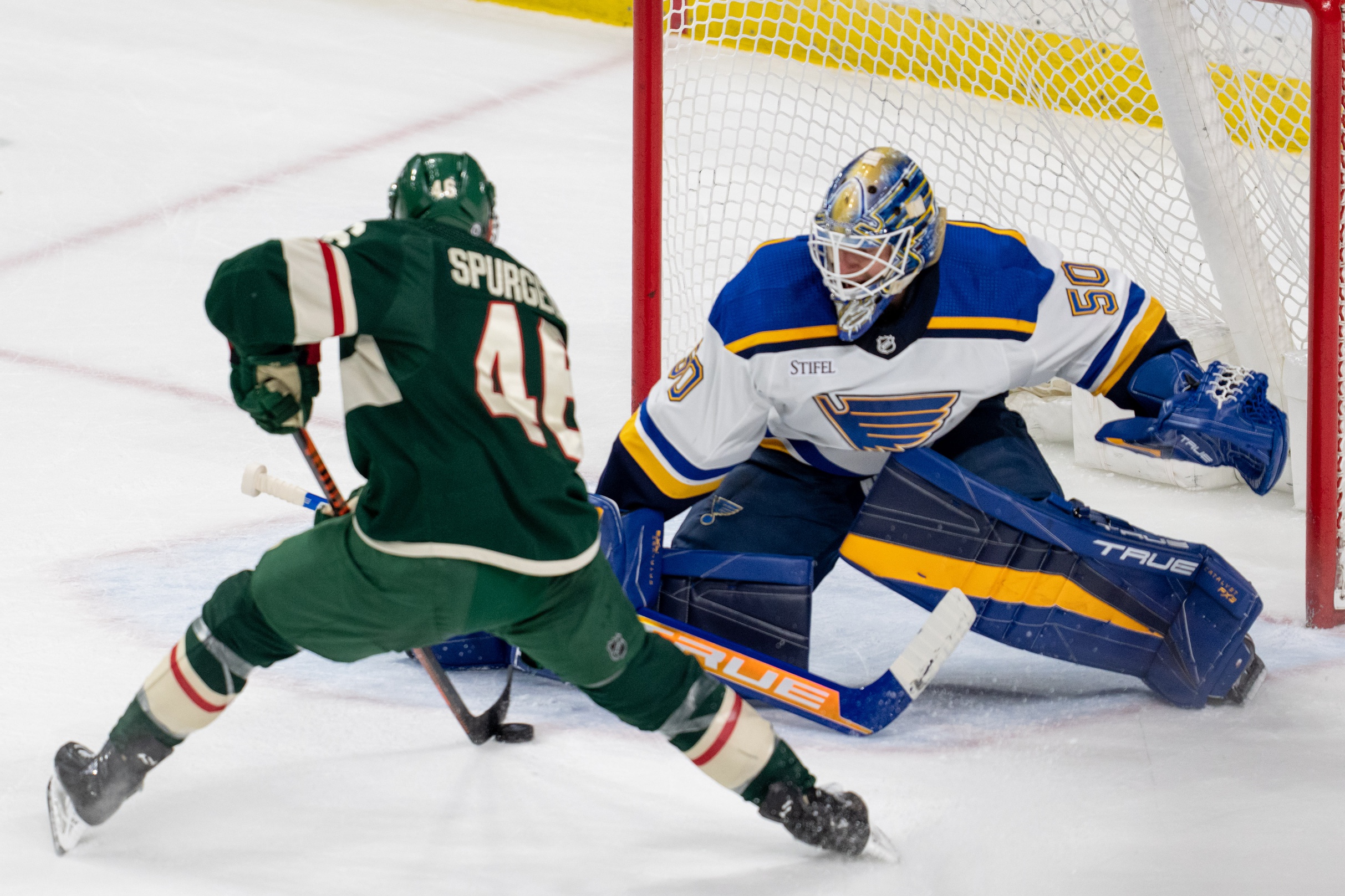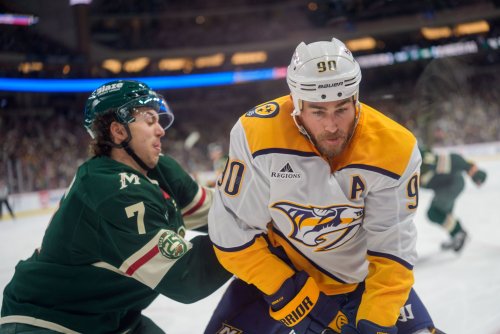
Today's the day. Thanksgiving. It's a big landmark in the NHL world. Chances are, if a team isn't in a playoff spot today, they won't be at the end of the season. As Ryan Lambert pointed out on his "Puck Soup" show this week, in the eight full 82-game seasons since the NHL's playoff alignment last changed in 2013-14, only 29 teams that have been in a playoff spot at Thanksgiving went on to miss the playoffs. Teams that are in, therefore, have about a 77% chance of staying in.
That's 3-4 teams per year, which sounds like good news for the Minnesota Wild. Three to four spots up for grabs? That sounds okay. But that's for the entire NHL, Eastern and Western Conference. In theory, that brings the number of available playoff spots for Minnesota to one or two.
So the Wild being out of a playoff spot at this point is bad news. They've been far enough out of a playoff spot to know for about a week that they'd be in this position come Thanksgiving. The math didn't line up, especially not with two games in 11 days between November 13 and 23.
But with where they're at today? It's not good. They're five points behind the St. Louis Blues and Seattle Kraken for the Western Conference's two Wild Card spots. And that's just at the top of the hill. Between the Wild Cards and Wild sit four additional teams Minnesota will have to pass in the standings to get into playoff position.
Let's take a look at these teams and whether they're vulnerable. Which current playoff team is the biggest fraud? Which teams lurking outside the playoffs provide the biggest threat to box the Wild out? We're gonna find out.
St. Louis Blues (First Wild Card, 21 points in 18 games)
Why they'll hold on: The Blues are getting something they haven't in the last few years: Actual NHL goaltending. In the last five years, Jordan Binnington's save percentage fell from .927 in 2018-19 to .912 in the following year, then .910, .901, and finally, .894 last season. Now that he's having a bit of a renaissance (.922 save% through 12 games), with 23-year-old Joel Hofer capably backing up (.914 save% in six games), St. Louis is shutting down just enough teams to get in a playoff position.
Why they'll blow it: No one else is doing much of anything. Robert Thomas leads the way with 17 points, with Pavel Buchnevich in second place with 11. Their power play makes Minnesota's look like the '70s Montreal Canadiens, entering Wednesday's action with just four (!!!) goals in 17 games. That might be OK, except they're controlling 45.6% of the expected goals share at 5-on-5. Yikes.
Fraud Factor? 50 of 10. Good goaltending with a punchless power play and horrible even-strength metrics is a recipe for the Blues to be one giant red flag. And that's if the good goaltending holds up. Until proven otherwise, Binnington should be expected to turn into the NHL's pissiest pumpkin.
Seattle Kraken (Second Wild Card, 21 points in 21 games)
Why they'll hold on: Overtime exists. Last season the Kraken showed surprising offense, but this season, they're falling back to earth. As a result, they're playing like the scrappy 2003 Wild: forcing overtime to collect as many points as possible. Just four of their seven wins came in regulation, and they lead the Western Conference with five loser points.
Why they'll blow it: A big part of the Kraken's step back offensively is the regression of Matty Beniers after his Calder Trophy-winning season. After 24 goals and 57 points in 80 games last year, Beniers entered Wednesday on pace for just 12 goals (on 18 expected goals) and 41 points. While his being outscored 6-17 at 5-on-5 is pretty unlucky, he's also not doing himself any favors with a sub-50% expected goals share. Seattle's lack of starpower means that a lot of hopes are on the shoulders of the 21-year-old to rebound.
Fraud Factor? 5 of 10. This isn't a great team, but playing low-event hockey, having a strong power play, and grinding out a bunch of loser points can get you in the playoffs. The Wild do have four games in hand, but they're going to need to win those out before they can keep pace with the Kraken's head start.
Arizona Coyotes (18 points in 19 games)
Why they're a threat: A second punch. Last season, Clayton Keller was basically on an island. His 37 goals were 13 more than second-place Lawson Crouse, and his 86 points led the team by 28 (Nick Schmaltz). Keller (17 points) and Schmaltz (14) are still leading the way, but new additions Logan Cooley (12 points) and offseason acquisition Sean Durzi are giving opponents something to worry about when Keller takes a breather.
Why they'll disappear: You maybe have to worry about the goaltending (.905 for the year) and about whether a team that's still a relative Island of Misfit Toys can sustain success all season. Assuming Keller, Schmaltz, Durzi, Cooley, and Crouse are their most important players, they have just five playoff appearances between them. Not their fault, but can they close the deal?
Fraud Factor? 4 of 10. Not a lot of proof of concept here, but this is a sneaky little team. They control 50.5% of the expected goals share, one spot behind the Vegas Golden Knights (50.8%) despite their lack of big names. They've got depth pieces like Crouse, Wild cast-off Jack McBain, and Juuso Valimaki making contributions for them. They have Dylan Guenther (14 points in 14 AHL games) and Victor Soderstrom (seven points in 14 games) if they want to inject more young talent at forward or defense. Watch out.
Anaheim Ducks (18 points in 19 games)
Why they're a threat: The kids are alright. With eight goals and 17 points, Mason McTavish is already halfway to matching his rookie totals of 17 goals and 43 points, and that's after just 18 games. 20-year-old Russian rookie defenseman Pavel Mintyukov has been a revelation on the blueline. Leo Carlsson's making an impact months after being the second overall pick. They're doing this all with Trevor Zegras being out recently and Jamie Drysdale being out most of the year.
Why they'll disappear: The vets aren't alright. How many of these guys do you actually like? Frank Vatrano's got 12 goals and shoots a lot, but he won't shoot 20% forever. Troy Terry is always good. But Ryan Strome and Jakob Silfverberg? They're firmly in the mid category. Adam Henrique, Cam Fowler, and Alex Killorn (when he's in the lineup)? Those guys are actively bad.
Fraud Factor? 6 of 10. There's so much young talent coming together that Ducks fans have to be happy no matter where they wind up for that reason. Is it going to come together this year? It depends on whether John Gibson (.926 save%) can continue to reclaim his half-decade-past status as a top goalie. Maybe it's possible now that the Ducks are merely kinda bad as opposed to a tire fire, but it might be next year until they jump into true playoff contention.
Calgary Flames (17 points in 18 games)
Why they're a threat: Their luck could change. The Flames are shooting just 7.8% at 5-on-5 and stopping only 89.7% of opposing shots. The Edmonton Oilers are the only Western Conference team that is worse off in both metrics. It didn't last season, with much better underlying numbers, but there's still the sense a team with Elias Lindholm, Nazem Kadri, Jonathan Huberdeau, Andrew Mangiapane, and MacKenzie Weegar should be way better than this.
Why they'll disappear: They might re-set before that luck turns around (if it ever will). The Flames can opt to blow up their team by moving out pending free agents Lindholm, Noah Hanifin, Christopher Tanev, and Nikita Zadorov. If new GM Craig Conroy is smart, he'll start the fire sale before the Flames get a chance to climb back in.
Fraud Factor? 0 of 10. They're not fraudulent, but that's kind of the problem. With last year producing similar results, little momentum now, and the possibility of losing several key players on the horizon, it feels easy to write the Flames off.
Nashville Predators (16 points in 18 games)
Why they're a threat: Because the Wild put themselves in a position for Nashville to be a threat. The Predators just hopped above the Wild in the standings last night, putting Minnesota in 13th place in the Western Conference. That doesn't happen unless you've played worse hockey than Nashville, who is not good.
Why they'll disappear: The Predators tried to go the Minnesota route last offseason, doing addition by subtraction by shipping out high-priced centers Ryan Johansen and Matt Duchene this offseason. The problem is, they forgot to do what the Wild did after they got rid of Zach Parise and Ryan Suter: Get good players. Ryan O'Reilly was a good pickup, but the rest... well, they were 13th in the West before last night.
Fraud Factor: 7 of 10. The Preds actually have one fewer win than the Ducks and as many wins as the Kraken and Ducks. Doing that with Juuse Saros uncharacteristically struggling is notable. Still, it's hard to believe in a team whose third-best forward is Gustav Nyquist and whose second-best defenseman is Dante Fabbro.
Will the Wild be able to pass any of these teams? They should. They have the talent, at least. But it's turkey time, and time is running out for Minnesota to get their collective act together. Anyway, Happy Thanksgiving.
Think you could write a story like this? Hockey Wilderness wants you to develop your voice, find an audience, and we'll pay you to do it. Just fill out this form.
-
 1
1








Recommended Comments
Join the conversation
You can post now and register later. If you have an account, sign in now to post with your account.
Note: Your post will require moderator approval before it will be visible.